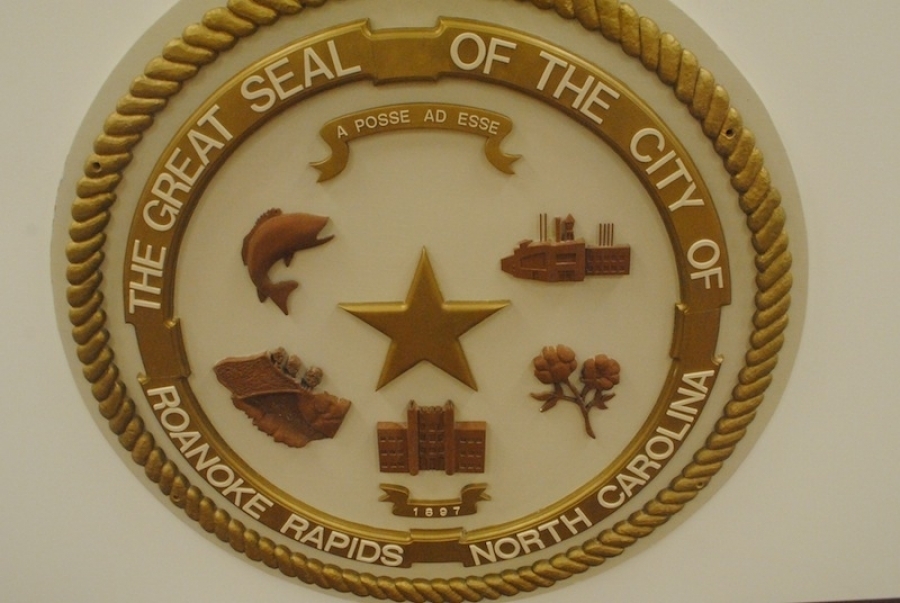While unanimously approving a $16,895,591 budget for the upcoming fiscal year, Roanoke Rapids City Council was divided on how to spend its American Rescue Plan Act funds and after a lengthy discussion approved four items from a long list of recommendations Tuesday.
“This is maintaining the current tax rate without an increase,” City Manager Kelly Traynham said of the financial plan. “The budget ordinance allows for operating expenses at their current rates.”
Councilman Wayne Smith asked about adding a fuel surcharge based on the current costs of fuel.
Public Works Director Larry Chalker said, “City Manager Traynham has recommended a $25 per household increase in the solid waste fee which is charged on the tax bill. This is still below the national average for collection of residential curbside waste.”
Chalker said, however, “We feel strongly that this additional increase will easily cover at this point the increase in fuel costs that we’re seeing. Next year we will re-evaluate that charge. Looking at the current economic situation, we feel this increase is fair. With the economy and the inflation we’re seeing, especially with fuel costs, this increase is included in that fee schedule.”
Traynham said that increase equates to an extra 45 cents a week.
Smith made the motion to adopt the budget and Rex Stainback cast the second.
Mayor Emery Doughtie discussed the $411,683 applied from fund balance to the budget. “We had to do it or cut some services. I think we let the city manager know they’ve done that before. We didn’t particularly care for it.”
Referring to the continued debt on the Roanoke Rapids Theatre, in which the city still has 10 more years of payments left, the mayor said, “We’ve got it down below $10 million and as the city attorney updated us tonight there’s a possibility that we might be receiving some funds, a sizeable amount of funds if the theater is sold or paid off. That would make a sizeable amount of reduction in that debt.”
Doughtie said $1 million has already been freed. “It would be really nice to get it down. We all know it’s been a large handicap to what we can do for our community for about 15 years. I’m proud that we’ve been able to maintain payments on that debt. I think we all look forward to getting it paid off.”
Capital items
While the panel, with Councilwoman Suetta Scarbrough absent, was unified on the budget, they approved on a split vote four capital items for funding through the financial resources coming from the American Rescue Plan Act.
The four items approved came from a longer list presented by Traynham.
The expenditures approved on a 3-2 vote, with Doughtie casting the tiebreaker, included $176,000 for OpenGov software; $57,220 to lease a new trash truck; $300,000 for employee bonuses; and $210,000 for a knuckle boom.
Traynham said the $300,000 for employee bonuses will mean an $1,800 bonus for full-time employees and a $500 bonus for permanent part-time employees.
But the disagreement between council members which led to the 3-2 vote — Carl Ferebee and Sandra Bryant voting against the proposal suggested by Smith — came after nearly an hour-and-a-half of discussion on the matter.
It was Smith who suggested that the four items be approved from Traynham’s list and then the panel go back and consider further items.
One of the issues that led to Bryant and Ferebee not voting for the condensed list was a pay study that was not included, something for which Bryant has been supporting.
Traynham said she did not recommend the study. When asked why by Ferebee the city manager said, “There are some resources available through the implementation from the software subscriptions that if funded will have some access to salary study information. We do strongly believe that a lot of people are going to expect that the results will happen immediately as a result of it. We are very concerned about employee morale as a result of any findings of the study.”
Bryant said, “The whole point of the salary study that I requested would be from a neutral person outside that would not be able to influence the information that we requested. The system that you all are looking at would be able to produce some of that information. It will depend on how it’s entered.”
Stainback said, “I support the salary survey at a time we know we have some funds to implement some of it or all of it but to do the survey now, we don’t have any funds to implement any of it. I think we’re buying the tires before we buy the car.”
‘Big impact’
Traynham said the options she presented were those that would allow the city to maximize the benefits of expenditures with the offsets of the ARPA money “and try to make a big impact on not only the organization but the citizens that we serve.”
She said, “We have an opportunity to utilize these granted funds to offer an experience that’s consistent with the demands of our community and our working staff.”
At a recent conference she attended with Doughtie and Ferebee there was talk about vision. “Where do we want to go? What do we do for the citizens as public servants? We try to do things that people cannot do for themselves. We have to be held accountable to the services that we provide and the funds that are spent. Financial health impacts everyone.”
In reviewing the items that had been discussed during a budget session last week, the city manager said, “As we move into these further recommendations, where do we want to be in 10 years? How do you see your community? That’s kind of the mindset I’ve had in mind in going into the recommendations that I’m going to present to you.”
Traynham said, however, “Results do not occur instantaneously or overnight. You can approve a funding decision but it takes time. We need to look at where we want to be. That’s why we’re about to make decisions today that we can accomplish within the next three years, five years, 10 years.”
She said the city needs to build an environment in government that helps to support the future “and it starts really with catching up on our needs today. We have a lot of significant needs. A lot of that goes back to the increased cost of really doing business, increased costs of equipment and everything else that comes with that.”
Traynham said the software, for instance, is one of those items that will help the city and the people it serves. “People want things done faster. The internet and online services have changed the way the world operates in many ways …”
A majority of the people in the world use the internet to book reservations as well as check the weather and movie schedules and do their banking. “Today’s youth and upcoming workforce are obsessed with technology … We live in a society that expects their needs to be met quickly.”
Said Traynham: “The way I feel is the city of Roanoke Rapids has an opportunity to utilize these offset funds to offer an experience that’s consistent with these expectations. If we continue with the status quo and don’t do what residents are increasingly becoming more accustomed to we’re going to continue to be trying to make do and trying to work around.
“Our employees are public servants, they’re here to provide a service that safeguards the resources of the community and provides details to everyone who needs it.”
There is almost $7 million in needs, the city manager said. “Right now we have people working who have equipment that doesn’t work and we’re spending a lot of money trying to continue to fix and repair equipment. It’s inefficient. We have to do something to try to make change here.”








